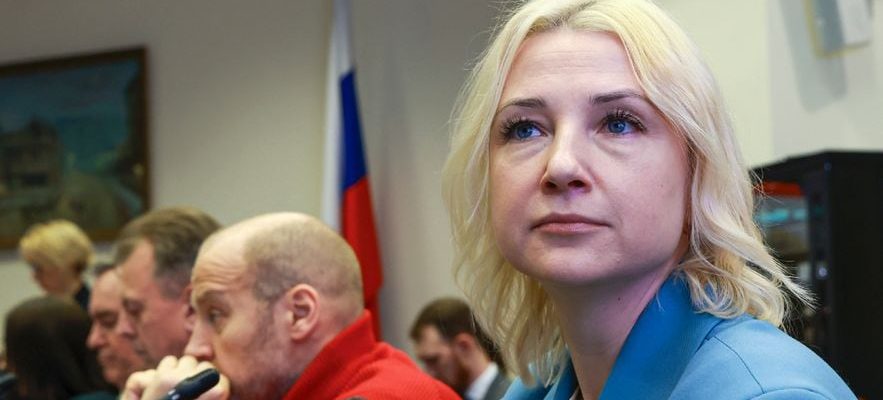Among the 16 official candidacies filtered by the electoral commission on December 20, one of them had the merit of attracting attention, as the few politicians authorized to run against Putin are insignificant. Ekaterina Dountsova, a 40-year-old journalist from Rzhev, in the Tver region, presented herself independently of any political party in the presidential election as “the candidate for peace”. A bold choice in a Russia fully engaged in the war effort on the Ukrainian front, where the slightest dissenting voice concerning the “special military operation” is immediately repressed.
“Document error”
Unsurprisingly, Ekaterina Dountsova’s bet was not successful. Arousing real enthusiasm among anti-war Russians, with more than 300,000 people subscribing to her Telegram channel in a few weeks, the hope of a real opposition candidate facing Putin fell on December 23, when the electoral commission refused his application because of a “document error”, according to the authority. A reason often used to refuse embarrassing candidacies for power, such as that of Alexei Navalny in 2018. Almost word for word, the president of the Electoral Commission, Ella Pamfilova, repeated to Dountsova the same sermon delivered five years earlier to the principal Kremlin opponent: “You are a young woman, you have the future ahead of you.”
The case of Ekaterina Dountsova reveals the major stakes that this election represents for power. Yet without political experience – apart from a short career as a municipal deputy in Rzhev – the candidate was unlikely to represent a real threat. But from the point of view of the presidential administration, it didn’t matter: it had to be ruled out. This bloc of technocrats massed around Putin, who unofficially designates who will or will not participate in the presidential election, has the mission of leaving nothing to chance: the president’s score must reach records and crush all competition, as in any authoritarian regime. . Spread out from March 15 to 17, 2024 due to the possibility of voting electronically in certain regions – which considerably facilitates electoral fraud for the authorities – this vote must give power a semblance of legitimacy.
Apparatchiks and unknowns
To achieve such results, the opposition to power must be well calculated. Duma deputy and leader of the nationalist “Liberal Democratic” party, candidate Leonid Sloutsky is already announcing the color: “I will not take away votes from the President of Russia […] Our president will win a huge victory!”, proudly exclaims this 55-year-old man, a fierce supporter of the annexation of Ukraine.
Journalist and former Russian municipal representative Ekaterina Dountsova, presidential candidate, attends a meeting at the Central Election Commission, December 23, 2023 in Moscow
© / afp.com/Arden Arkman
Theoretically the second political force in the country after the presidential party “United Russia”, the Communist Party will not be represented as expected by its emblematic leader, Gennady Zyuganov, candidate in the elections of 1996, 2000, 2008 and 2012. The choice of his successor finally turned to Nikolai Khartinov, an apparatchik devoid of charisma and, above all, aged 75, two characteristics which will highlight Vladimir Putin, who celebrated his 71st birthday this year.
Strangely, a young man of 39 will contrast with assumed gerontocracy: Vladislav Davankov, co-president of the Duma, will be a candidate for the entrepreneurs’ party “New People”. He will replace the founder of this training created in 2020, Alexeï Nechaïev. The latter announced his withdrawal from the race after learning that Zyuganov would not run. Both “did not want to collect a lousy score, since the presidential administration wants to offer Putin a record percentage, around 80%”, analyzes Andrey Pertsev, Russian political analyst.
“False disruptors”
“Due to Zyuganov’s refusal to play Putin’s ‘sparring partners’ during this election, one or two ‘false disruptors’ could enter the presidential race, continues Andreï Pertsev. The Kremlin is therefore considering registering Andreï Bogdanov”, technocrat close to power and affiliated with the “Russian Party of Freedom and Justice”, which is liberal in name only.
Among the politicians classified as liberal – but who remain tolerated by the Kremlin – candidate Boris Nadejdine announced his candidacy via his “Civil Initiative” party, and affirms in his program a firm desire for change. However, the chances of him collecting the 100,000 signatures necessary to contest the electoral race are low. As for the Yabloko party, led by Grigory Yavlinsky, candidate in the 2018 election, it did not even want to try its luck. As the only political organization to maintain an anti-war position in Russia, it “will not send anyone, because everyone knows that none of its candidates will pass the validation stage of the electoral commission”, explains Andreï Pertsev. In Russia, only a candidacy coordinated in advance with the Kremlin has a chance of competing. For the glory.
.
